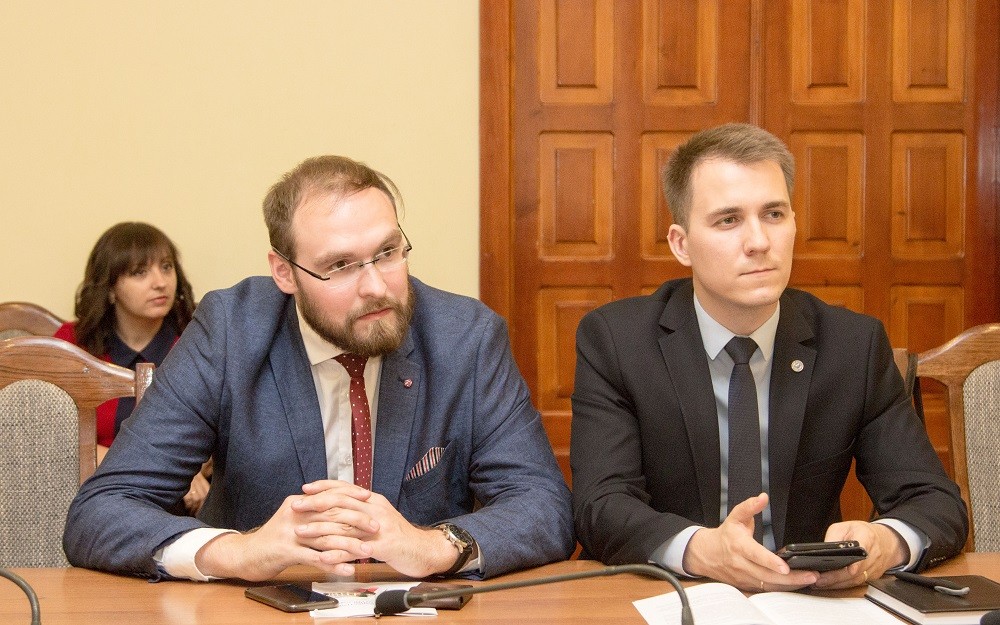Tiraspol, 1 June. /Novosti Pridnestrovya/. Cultural cooperation between Poland and Pridnestrovie was discussed today by representatives of the University of Warsaw and Shevchenko Pridnestrovian State University (PSU). The scientific conference "Poland and Pridnestrovie: from history to the present" had brought together historians, lawyers, economists and students.
The Polish delegation included employees of the Polish embassy to Moldova, as well as graduate students of one of Poland's largest and most prestigious state universities.
 Photo by press centre of PSU
Photo by press centre of PSU
Pridnestrovian President Vadim Krasnoselsky had sent a welcome address.
"Ethnic Poles living in Pridnestrovie try to preserve their identity. For example, the Center of Polish Culture has worked in Pridnestrovie for more than 10 years. Its activists help to preserve their native language, organise Polish classes, pass on their culture to the younger generation and share this wealth with other nationalities," the president emphasised.
Over a thousand Poles live in Pridnestrovie today, according to the 2015 census. They carefully preserve their traditions, culture and language. And at the same time, they consider Pridnestrovie to be their homeland. As a member of the Board of the Foundation of the Institute of Eastern Law of the University of Warsaw Michal Sadlowsky noted in an interview with PGTRK journalists, Poland seeks to maintain ties with the Poles living abroad.
"We are pleased that the Poles, who have preserved their traditions, live here. I am glad that the authorities help to preserve these traditions... It is gratifying that the Poles, Russians, Ukrainians live here in peace. This is a very interesting experience for us," he said.
 Photo by press centre of PSU
Photo by press centre of PSU
In his speech, Sadlowsky regretfully stated that there were no good monographs in Poland on the legal status of Pridnestrovie, and Polish citizens had no unbiased information about our country. Nevertheless, Sadlowsky notes a dynamic increase in interest among the Poles in Pridnestrovie as a tourist destination.
"Many of my compatriots wonder how they can come here!" he says.
The State Customs Committee of the PMR also notes the growth of economic ties between the two countries. According to customs statistics, over the first four months of 2018, the trade turnover between Pridnestrovie and Poland grew by 4.5 times. Moreover, Pridnestrovie's exports to Poland significantly increased up to $ 24.7 million, which is nearly tenfold in comparison with the same period last year.
The ancestors of our Polish compatriots lived in Pridnestrovie alongside other ethnic groups even in the late Middle Ages. It is no secret that the two countries have close historical ties. The report of the well-known Pridnestrovian historian Nikolay Babilunga "Poland, Pridnestrovie and Cossack raids to Moldavia in the Middle Ages: the common pages of history" was devoted to that topic.

Photo by press centre of PSU
For centuries, northern Pridnestrovie was a part of the Grand Duchy of Lithuania, and then of the Polish-Lithuanian Commonwealth (Rzeczpospolita, the name of the Polish kingdom in the 17-18th centuries). However, this land was mostly settled by the Cossacks - freedom-loving people, for whom living on a frontier was a way of life.
"Pridnestrovie was the first line of defence of the Cossacks, who also defended Poland," says Nikolay Babilunga.
At the same time, the Cossacks perceived the rulers of neighbouring Moldova as vassals of Turkey, which also pursued its interests in this region and created a line of powerful fortresses on the right bank of the Dniester. Pridnestrovie, however, was regarded as a freeland of the Cossacks. For example, the famous ataman Severin Nalyvayko even offered the Polish king to create here a Cossack state, promising in return to defend Poland.
"The creation of a buffer Cossack state would have created a stub for the efforts of other powers. Perhaps it would have prevented Poland from the partitions," Nikolay Babilunga believes.
The second partition of weakened Poland by the powerful states - Prussia, Austria and Russia - occurred in 1793. Since that time, northern Pridnestrovie became a part of Russia. At the same time, as the historian notes, the Poles who lived here were not oppressed by St Petersburg.
"All the estates of the Polish magnates were purchased by the treasury at their real value. Russia actually bought these lands," Babilunga cited an example.
Another participant of the conference - the envoy of the Polish embassy Jerzy Stankiewicz - also noted the long-standing ties between Pridnestrovie and Poland.
"They were kept through various historical epochs and have continued to this day... Interest in our culture and language does not fade away in this region," the diplomat said, noting that Poland also does not stand aside, helping, for example, to reconstruct the House of Culture in the village of Rashkov, where there is a Catholic church.

Photo by press centre of PSU
According to the deputy rector on science and innovations, Yelena Bomeshko, there is growing interest today in an objective assessment of the situation around Pridnestrovie. Cooperation with Polish universities is one of such manifestations. The Poznan Science Center works actively with Pridnestrovian archaeologists in the field of anthropological research. PSU's Faculty of Philology employs teachers from Polish universities. and publishes textbooks for studying the Polish language and culture.
Yelena Bomeshko said that one of the outcomes of the conference might be an agreement on cooperation with the University of Warsaw in the field of scientific research and educational activities.



